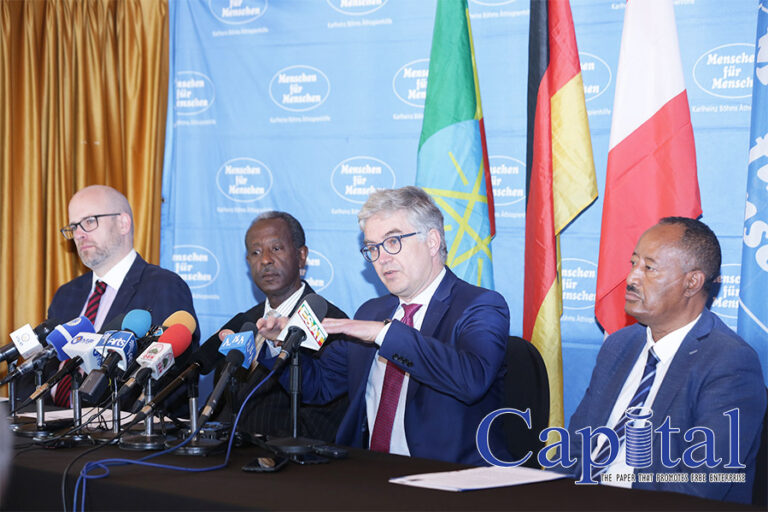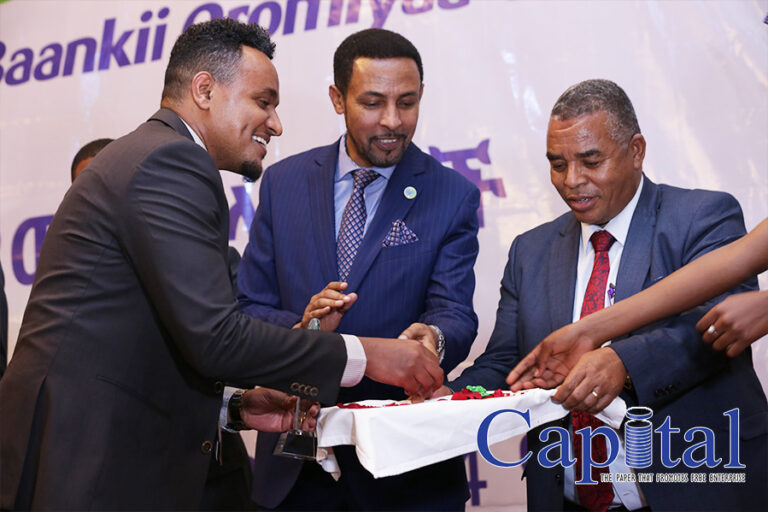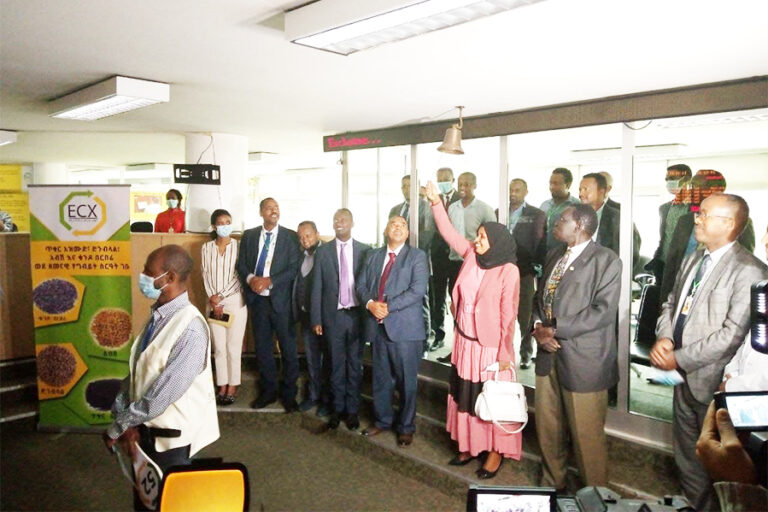Menschen für Menschen foundation (MfM) project puts West Shoa on the coffee production map of Ethiopia. The reputable international foundation, which is celebrating its 40th anniversary, has also allocated the biggest ever budget on projects that will be run in the 2022 budget year.
Yilma Taye, Country Director of MfM, said that the Dano integrated rural development project which is located 235 km west of Addis Ababa began in 2017, “we have identified the area that has ecological similarity with coffee production areas like Jimma. Following the identification of a flourishing ecosystem we introduced the distribution of coffee seedlings to the farmers, who amazingly accepted.”
“We are expanding to provide coffee seedlings in millions to the farmers in the area,” stated Yilma whilst recalling the support of Dallmayr Coffee – a German based prominent coffee company and one of the major Ethiopian coffee buyers, which has supported MfM on the multipurpose tree plantation program that includes fruit and coffee seedlings. The German firm capitalized on the opportunity and provided its wide range support to accelerate the coffee plantation program in western Shoa.
“To create jobs we have organized the youth in the area and established the required facilities to process the harvested coffee. They are buying the bean from the farmers and process it to supply to the market,” noted Yilma.
He said the MfM’s vision is to make the areas of ‘West Shoa as a Coffee Hub’ despite it being a new comer in the coffee map of Ethiopia. West Shoa is well known for its grain production as opposed to the brown bean, however, this narrative is now changing and export of the bean has already commenced.
The prominent German company has also identified that the coffee harvested in West Shoa is high grade. As a result it has started buying the bean and stocked the high quality coffee on its shelves for sale.
Dallmayr is buying the bean through Bageresh Coffee, one of the prominent coffee exporters in Ethiopia, and has introduced the bean under the brand ‘Dano Coffee’ to the global market.
“Our other project at Dano is expanding the production, productivity and marketing Niger seeds, which are one of the major products cultivated in the area,” Yilma says, adding, “we have organized the youth to engage on value addition of Niger seeds as edible oil and cake animal feed.”
“Our major target is to work on the area to expand the coffee and fruit plantation. For instance in the current planting year 19.4 million seedlings will be available for different project areas of the country and of that 30 percent will be fruit seedling,” he said.
MfM which was established four decades ago by the late Karlheinz Bohm has engaged on well accepted developmental projects in the country.
The foundation began through provision of relief aid in Erer valley, East Hararghe, and over the following years developed an integrated rural development approach for lasting impact.
The Foundation’s Executive Board Member and speaker, Sebastian Brandis, said that MfM is providing direct and critical development support like water, health service, decent income, education and land management for the public who are in need. The foundation has conducted its activities under the principle of independence from any other interest. “We don’t call our operations as aid, because aid is a symmetric. For us we collaborate in every project we are involved in with the local community. All we do is we enable people, and bolster self-confidence and create a pathway where the community can design their own life and destiny.”
During the press conference held Wednesday February 23, Brandis announced that Menschen für Menschen Foundation approved its first ever huge amount of 900 million birr for humanitarian and integrated rural development projects in Ethiopia, in the 2022 budget year.
He also noted that in the budget year, the Foundation will prioritize sustainable land management, water and youth job creation. Equivalently, the education and human development activities will also be kept in regular basis he explained.
The international foundation has also stated that it will continue providing its support in the rehabilitation program on the areas affected by the war in northern Ethiopia.
In its 40 year-operation, MfM has invested seven billion birr and constructed 461 schools, 6 technical colleges and different massive social and economic facilities for the public.
MfM places West Shoa on coffee production map
Oromia bank recognizes 30 high value customers
Oromia bank acknowledges its best performing exporters and high values customers in the first half of the fiscal year.
During a ceremony held on Thursday February 24, 2022 at She raton Addis luxury hotel, the bank awarded 30 high performing exporters in 6 different divisions.
raton Addis luxury hotel, the bank awarded 30 high performing exporters in 6 different divisions.
“These esteemed customers have highly contributed to the foreign currency generation efforts of our bank,” said Teferi Mekonnen, president of the bank.
The ceremony was graced by Gebremeskel Chala, Minister of Trade and Regional Integration, Sofia Kassa, State Minister of Agriculture, officials from the bank, correspondents and international money transfer agents working with the bank in addition to the bank’s customers.
ECX to open special window for sesame seeds
The electronic trading platform, Ethiopian Commodity Exchange (ECX) officially launches the trading of spices for the first time in its close to a decade and half years of operation. The trading floor has also disclosed that it will open a special trading window for traders who use sesame seeds as industrial input.
Moreover, additional species, pulses and oil seeds will be included in the trading platform besides aromatic gum and resins.
The newly added commodities at the electronic trading platform is connecting buyers to sellers through its expansion of products that it manages as the non-mandated and mandated trading products now reach 17.
The latest move of ECX is a big journey in its 14 years of operation due since all along it had not debuted spices on its floor.
Under the new non mandated or alternative trading scheme, ECX has commenced the trading of vech/grass pea, and four species; coriander, fenugreek, black pepper, and black cumin. Ethiopia is one of the major producers of species like fenugreek and black cumin in the continent and has a potential to earn significant hard currency from export.
During the ECX’s spices and vetch trade launching program that was held on Thursday February 24, a quintal of black cumin was traded for 26, 500 birr while a quintal of greenish fenugreek traded for 12,500 birr.
The commodities that were introduced at the trading floor have been noted to have high demand in the global market. Besides the newly introduced five commodities, ECX is trading haricot beans, niger seeds, maize and wheat as non mandated products.
The exchange has also disclosed that as of next week the trading floor will commence the trading of sesame seeds under special window for local industrialist.
It is to be recalled that the modern trading platform introduced a special window for soybean buyers, who use the commodity as input for their value addition industrial product.
“As per the experience we tapped from the soybean, we have finalized to facilitate special trading of sesame seeds,” a statement from ECX says, adding “due to that as of next week industrialists who are using sesame seeds as input shall trade through the special window.”
ECX disclosed that it has concluded the first stage study to introduce the trading of more commodities at the floor.
The agriculture commodities that are under the study are: amomum/Ethiopian cardamom, lupinus termis forssk, aromatic gum and resins, rice, turmeric and groundnut.
Redefining MSMEs financing through uncollateralized digital lending
With only 0.5 percent of depositors in the country having access to credit, a knowledge sharing session has suggested expansion of uncollateralized digital lending to make micro, small and medium enterprises (MSMEs) beneficiaries.
During the knowledge sharing session organized by Kifiya Financial Services Technologies in association with the International Financial Corporation (IFC), and MasterCard Foundation, Ethiopia was stated to have a very poor provision of uncollateralized credit.
Munir Duri, The CEO of Kifiya Financial Technologies PLC, stated that there is huge potential for Ethiopia to increase its lending to MSMEs using artificial intelligence based uncollateralized digital lending.
“Reducing the transaction costs, digitizing the credit operation and expanding the use of technology based credit scoring models at the credit reference bureau in the regulatory and financial industry is crucial. This is necessary for us in order to alleviate the shortcomings in this space so as to provide financing for those who badly need it for their operation and economic growth of the country,” said Frezer Ayalew, Director for Banking Supervision Directorate of National Bank of Ethiopia.
Kifiya is pioneering a unique approach to the challenge through its digital lending technology, Qena, which connects businesses to credit without the need for collateral, leveraging new approaches to credit scoring.
There are a total of 850,000 MSMEs in Ethiopia, which created a total 4.5 million jobs, while only about 130,000 have access to credit and the total financing gap is estimated to be approximately USD 4.2 billion.
Frezer highlighted that there is about 350,000 credit accounts in the country which is a drop in the ocean when compared with the 72.3 million deposit accounts registered in the various financial firms.
“Of the stated credit accounts, 44 percent of the borrowers are duplicating borrowers of the entire banking sector credit,” he says, adding, “when it comes to the number from the borrowers 0.6 percent only takes the great chunk of portfolio.”
Frezer said that the regulatory body is initiating policy frameworks to flourish the credit provision for MSMEs including the use of the uncollateralized schemes.
Currently, MSMEs are mainly accessing credits from microfinance institutions.
“This is the beginning of a knowledge series that seeks to convene experts to debate, share ideas, experience and lessons to provide digital financial services to small businesses and smallholder farmer,” Kifiya’s CEO expressed as he suggested way forwards in bridging the knowledge gap in the sector.
The knowledge sharing session saw policymakers, sector actors and MSMEs share a flurry of ideas for the betterment of the sector.








